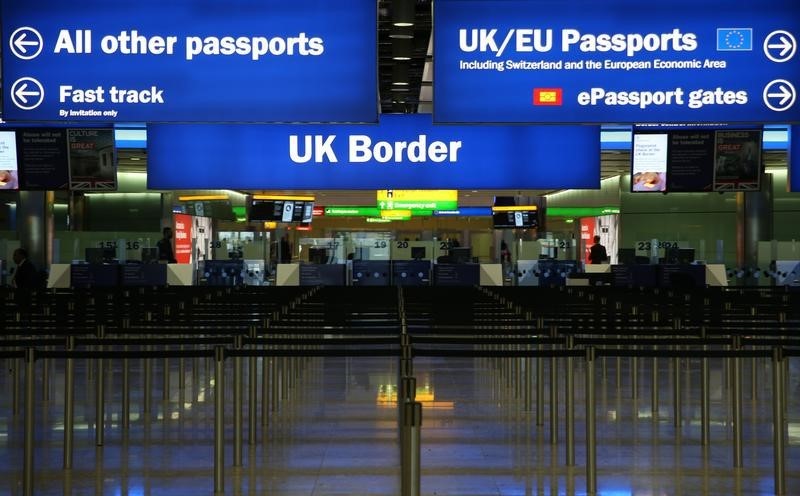By William James
LONDON (Reuters) - Long-term net migration to Britain has hit a record high, underscoring the challenge Prime Minister David Cameron faces to dispel voter fears that immigrants are straining public services such as housing, hospitals and schools.
As an island nation off northwest Europe, Britain is far from the frontline of the EU-wide crisis that has seen hundreds of thousands of migrants and refugees pour into the bloc this year via countries like Italy, Greece and Hungary.
The bigger problem for Cameron is his inability to limit immigration by European Union passport-holders, as freedom of movement is enshrined in the EU's founding treaties. Arrivals from countries like India and China are also on the rise.
Official data on Thursday showed a net 330,000 people moved to Britain in the year to March 2015, up 40 percent on the same period a year ago. A net 183,000 came from within the EU, up by 53,000.
The quarterly figures have become a regular source of political embarrassment for Cameron, who has insisted he is still working towards a declared overall target of less than 100,000.
Curbing migrants' access to welfare benefits in order to deter them from coming to Britain is a key objective for the Conservative prime minister as he renegotiates the country's relationship with the EU before putting its continued membership to a public vote by the end of 2017.
Immigration minister James Brokenshire said the latest data was "deeply disappointing".
"While these figures underline the challenges we need to meet to reduce net migration, they should also act as a further wake-up call for the EU. Current flows of people across Europe are on a scale we haven't seen since the end of the Second World War," he said in a statement
'BORDERLESS BRITAIN'
Rising immigration has fuelled support for the UK Independence Party (UKIP) which wants to sever ties with the EU and impose much tighter entry rules.
"These figures reflect Borderless Britain and total impotence of the British government," UKIP leader Nigel Farage said, calling for Cameron to negotiate tighter border controls with the EU.
The debate has intensified in recent months, with the huge influx into EU of migrants and refugees fleeing poverty and war in the Middle East, Africa and elsewhere.
Images of thousands of migrants camped in the French port of Calais seeking illegal passage to Britain on board trains and lorries have led news bulletins for much of the summer.
The data showed that asylum applications had risen by 10 percent but, at 25,771 in the year ending June 2015, remained low in comparison to other channels of migration and well below their 2002 peak of 84,132. A total of 11,600 people were granted asylum or an alternative form of protection.
In the same period, China and India accounted for the largest share of those granted visas to come to Britain from outside the EU, followed by the United States.
Cameron, who was elected for a second term in May, has been criticised for setting a fixed target for migration. Many employers say attempts to slow immigration will make it harder for them to find the skilled workers they need.

"Scrabbling around to find measures to hit a bizarre and unachievable migration target is no way to give British businesses the stable environment they need," said Simon Walker, director general of business lobby group the Institute of Directors.